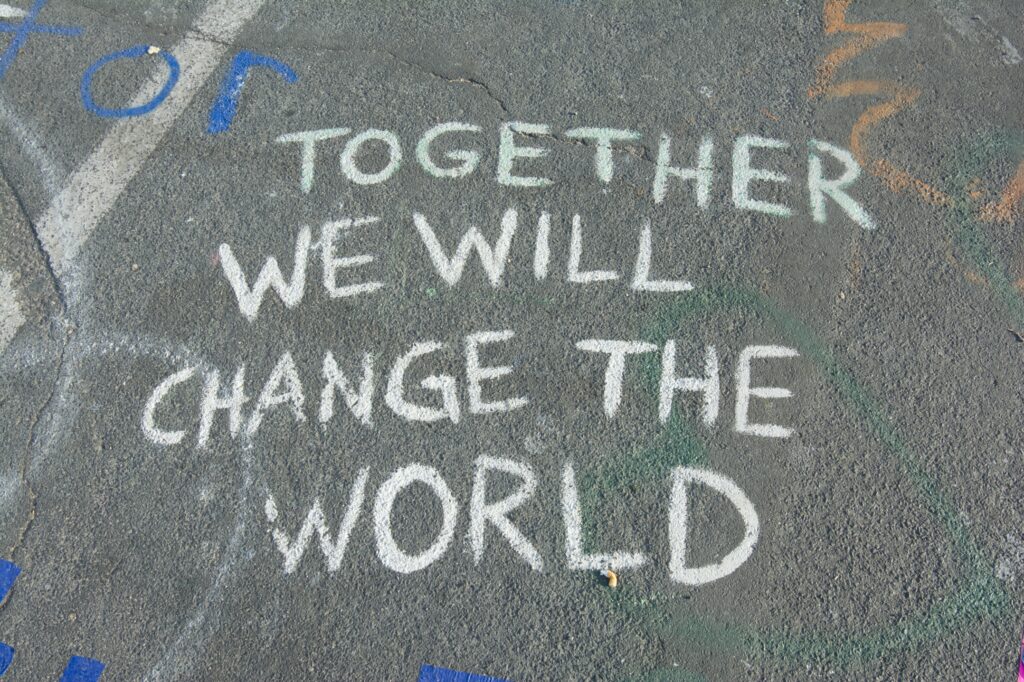Hollywood frogs – The big change

Films are not reality, we all know that. Yet influences from films sneak into our minds without us realising it, skewing how we look at the world. This series examines some of these ‘Hollywood Frogs‘. This post: The big change.
Part I: Changing yourself

An unforgettable evening. A teenager, I was getting ready for a party. But not just any party. This was the moment I had long been waiting for, the moment that would transform my life forever. I had invested in disposable contact lenses, bought a new dress – black, tight-fitting – carefully applied make-up and selected my best jewellery. I was going to glide into the room as a beautiful swan. Everyone would turn their heads to gaze at me in jaw-dropping astonishment, and my days as an ugly duckling would be left behind forever.
What was in my mind was a vintage Hollywood script. You’ve seen it a thousand times, both in films and in TV spillovers: Grease, Strictly Ballroom, Miss Congeniality, ‘Plain Jane Superbrain’ from Neighbours. Shy, introverted, homely character removes glasses, applies make-up, puts on a pretty dress and – hey presto – is instantly hot. The magical effect isn’t limited to women, either. Superman and Spiderman may have had superpowers, but it was removing their glasses that was the real key to their transformation from zero to sex symbol.
I never got my Sandy moment, of course. At the party, no one even noticed anything different about me. Afterwards, my best friend said consolingly, ‘You looked really nice!’. Then added, ‘It’s just that Charlotte and Becky are sexier’.
That was when I first discovered that those dramatic transformations from the films only exist – surprise surprise – in films. Duckling to swan, miser to philanthropist, villain to hero. In reality, we drag along the baggage of our past selves and the expectations people have built up about us. The homely girl in a slinky dress is still seen as homely, the sexy girl in a scruffy tracksuit is still seen as sexy. Changes can even go completely unnoticed because of this blindness to the unexpected. My mother still scolded me for biting my nails years after I had broken myself of that bad habit.
In any case, superficial changes such as clothing and makeup mean little. Sexiness has far more to do with attitude than appearance, which is why someone like me, introverted and with low self-esteem, was never going to be able to match up to the confident Charlottes and Beckys of this world, no matter what I wore. Watch that Grease clip again. The clothing has changed, but that’s not the half of it – Sandy is behaving like a completely different person, alluring, self-assured, and out to get her man. How we dress is an expression of our personality. In real life, it is not possible to reverse this process and change our personality just by donning different clothes.
Suppose, for a moment, that we actually succeed in our desired change. That doesn’t mean that those around will react in the way we hope. A homely girl who behaves in a sexy manner is ‘sad’ – who does she think she’s fooling? An introvert who suddenly starts dancing at a party is probably drunk, why else would they behave that way? Oh dear, won’t they feel stupid in the morning! And misers or villains who turn over a new leaf are clearly not to be trusted – they must be up to something. We prefer people to stay in their pigeonholes, then we know where we are with them.
In Hollywood, on the other hand, it is a matter of course that people should change, and it is also clear in what direction the change should go. More extrovert, more attractive, more successful. That final scene in Grease actually starts with Danny trying to change himself, dressing smartly in a school blazer to fit into Sandy’s world. You can almost hear the audience holding their breath in disbelief – surely this can’t be allowed to happen?! Then the huge sigh of relief as Sandy turns up, and the change reverts to the conventional line.
The character who is already successful may ‘give it all up’, to ‘rediscover what is important in life’. But, in the end, this change invariably still boils down to success, albeit in a more down-to-earth, small town form (Baby Boom, pretty much any Hallmark film). A rare example of someone swimming against the flow of Hollywood changes is the character of Jennifer in Pleasantville. A popular, sexy girl whose highly unusual journey to self-fulfillment involves putting on glasses and choosing quiet study over parties and boyfriends.
Changes in films are met by applause not only from those in the cinema, but from the other characters in the film. Even previous enemies will often begrudgingly show admiration. Hollywood changes demand validation by an approving audience, on- and off-screen. In the climax of the animated film ‘Sing‘, a group of misfits is about to perform in an almost empty, half-demolished theatre. Their director gives a moving speech about how it doesn’t matter, because they are doing this ‘for themselves’. A charming sentiment…yet as the show proceeds, it accumulates a huge, adoring audience, gets broadcast on TV and ends up saving the theatre.
This is another aspect of Hollywood changes – they need to be big. Small steps in the right direction don’t satisfy Hollywood. It is not sufficient to overcome your shyness to sing on stage, you must bowl over the entire audience and land a record deal. Not enough to bolster your self-esteem to withstand the attacks of bullies, you must utterly defeat them in a public competition. Not acceptable to appear beautiful in the eyes of the person who loves you, you should make the whole group wolf-whistle as you walk by.
These radical changes are remarkably easy to accomplish in films. In real life, I hit a dead end when attempting to learn to juggle or roll a kayak. Despite understanding what I had to do, and getting plenty of patient support from friendly instructors, every time I tried to do it my stupid body failed to perform. Yet far more complex transformations are a piece of cake in Hollywood. Just believe in yourself, and the rest will follow. There are, of course, a few appropriately dramatic moments of doubt or despair. But these are quickly solved by a heart-to-heart with a trusted friend, mentor or family member. Doubts melt away, skills are mastered after a few attempts, hurdles are surmounted, life is never the same again.
Once complete, the change is permanent. No risk of slipping back to your old homely self, of faltering in that fabulous career, of those bullies you stood up to coming back to hassle you again. No possibility of regret as you realise that the change wasn’t actually what you wanted after all. Hollywood changes are like avalanches, swift, unstoppable, irreversible forces of nature.
Part II: Changing the world

It’s not only changing yourself that’s easy in Hollywood. Changing the world is child’s play too. Perhaps that’s why children regularly do it, such as Pollyanna, who brought happiness to the miserable town of Harrington. A childlike enthusiasm is the next best thing, like Mr Smith, who restored decency to a corrupt Washington, or Deloris Van Cartier (masquerading as Sister Mary Clarence), who first turned a failing convent into the heart of the community, then a rebellious class into a competition-winning choir. The principle is the same, determined effort, exuberance and perky optimism is swiftly followed by a satisfying result.
The gap between Hollywood fantasy and real life is brilliantly exposed in the ‘Strike!’ episode of the TV series ‘The Comic Strip presents’. It shows a Hollywood-style take on the 1980s miner’s strikes in the UK, in which their leader, Arthur Scargill, rides on a motor bike from Wales to the Houses of Parliament in London, where he delivers an emotional speech that has tearful MPs immediately voting to save the mines. In reality, the miners’ strike was ended without them achieving their goals, and the mines all eventually closed.
Hollywood would have us believe that one charismatic person can instantly bring about change. It can’t handle the complex reality of social change, such as the UK suffragette movement, whose members struggled for 25 years before women got the right to vote. Or Reagan’s dramatic speech urging Gorbachev to ‘Tear down this wall’, which in Hollywood would have led to an emotional crowd spontaneously ripping down the Berlin wall. Whereas in reality the wall wasn’t torn down until two years later – not in response to Reagan’s speech, but to a complex web of political and social changes in East Germany.
Neither can Hollywood face up to the gradual pace of technological and scientific innovation. The internet can trace its roots to the 1960s, electric cars were already on the road in the 1890s, DNA was first isolated back in 1869. Small discoveries building on each other, scientists learning from their predecessors and then patiently going on to solve another piece of the puzzle until, finally, everything fell into place. But that is not Hollywood’s style. It doesn’t want ‘standing on the shoulders of giants’, it wants a single giant to sprout in the space of two hours.
Because Hollywood teaches us that we can rapidly achieve extraordinary results, we risk becoming disillusioned when this turns out to be a fairy tale. We feel disappointed in the apparent lack of progress, both in ourselves and in others, and become cynical and apathetic. Hollywood doesn’t train us for the long slog. For the dedication and persistence required to progress from apprentice to master. For the infinite patience required to make incremental improvements, and to pick up and start all over again when we hit a dead end. For the slow evolution driven by a million tiny pressures, in which most of us will never be a pivotal figure, but just one of the crowd of anonymous voices that finally achieves momentous change.
This disenchantment does us grave disservice. Because we can change, we do change. Change ourselves, change the world. It may not be quick, easy or dramatic. But it’s real.
“Thus gradually by silent and stealthy influences are great changes wrought”
Nathaniel Hawthorne
It’s true, I never had my Sandy moment. What I did do instead, was gain enough self-confidence to dare to flirt with the man I have now spent almost half of my life with. A minor alteration, beneath the notice of Hollywood. But for me, it was as life-changing as anything on the silver screen.
Next Hollywood Frog: Sex